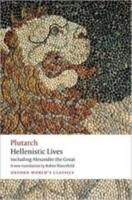
OUP (2016) p/b 525pp £12.99 (ISBN 9780199664337)
It is ironic that Plutarch’s Parallel Lives should have come to be regarded as an indispensable source from which so much history of the ancient classical world can be mined: ironic because, as he famously asserts in his prologue to the Lives of Alexander and Julius Caesar, he is not writing history, but biography, writing with the aim of revealing character rather than recording deeds that will provide a consistent narrative record.
He generally sought to fulfil this aim by writing a Greek and a Roman life in parallel with a brief combined introduction, then rounding them off with a reflective comparison from which moral lessons could be drawn. But as Andrew Erskine’s concise and helpful general introduction to the translation under review points out, perhaps rather wistfully, ‘Modern translations, driven by the demands of the publishing industry and university history courses, generally split the pairs to create separate collections of Greek and Roman lives.’
This is, with one exception, the course followed by this translation, offering eleven lives, of which two are combined (Agis and Cleomenes) and only two of which are in parallel (Philopoemen and Flaminius). These lives generally fall within the Hellenistic period as traditionally defined i.e. from the death of Alexander 323 BC to the battle of Actium 31 BC. Each life has a short introduction setting it in context and offering a useful bibliography. The translation itself is workmanlike and reads easily and without pretention.
Plutarch’s habit of invoking earlier Greek writers, either directly or by allusion, and the need to help the modern reader navigate the complexities of the protagonists and the events of the period, have resulted in almost one hundred pages of short but helpful explanatory notes. These are followed by textual notes, a glossary, short biographies of prominent figures, and indexes of Plutarch’s cited sources and of proper names.
With a chronology and maps, this is a practical and helpful book for the student of the Hellenistic period, but one has a nagging feeling that Plutarch would be disappointed that, to read all the surviving lives in their original pairings (and therefore for their original purpose), one must rely on Arthur Clough’s nineteenth century revision of John Dryden’s seventeenth century translation or the Loeb translation of nearly one hundred years ago.
But if one of the translator’s tasks is to help the reader enjoy his author (and some of Plutarch’s anecdotes are quite amusing—a housewife preparing a meal ‘in a tizzy’ expecting Philopoemen as an honoured guest, mistaking him for a servant, ordering him ‘to help with the chores’ and his playing along with a rustic accent), then this translation certainly succeeds.
Ray Morris
